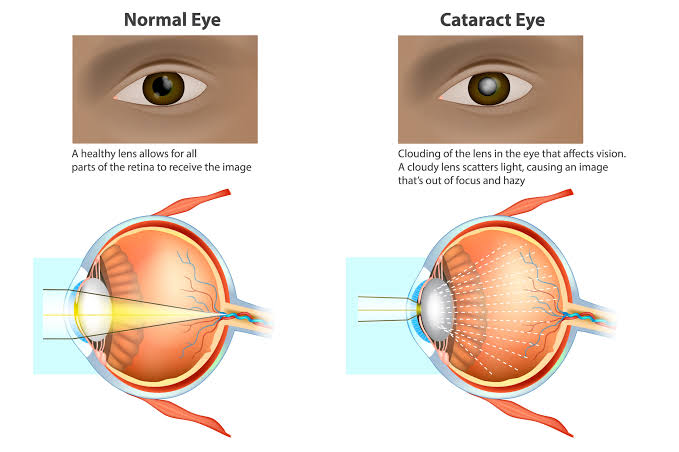FREQUENTLY ASK QUESTIONS AND ANSWERS ABOUT CATARACT
1). AT WHAT AGE WILL ONE GET CATARACTS?
As we begin to age, our eyesight starts to change. Unfortunately, an inevitable part of aging is the natural deterioration of proteins within the eye’s lens. When this process begins to happen, it causes cataracts and leads to foggy vision.
While the breakdown of proteins starts between the ages of 40–50, cataract symptoms usually occur within a patient’s 60s.
While less common, young people may also develop cataracts. In children, juvenile cataracts can develop as the result of a genetic mutation that affects proteins, metabolic disorders, congenital infections, or due to an eye injury during delivery or thereafter.
Babies, young children, and middle-aged adults can also have cataracts, either present at birth or sometimes related to other medical conditions.
Age is the greatest risk factor for cataracts. Cataracts typically begin developing in people age 40 years and older but don’t usually begin to impair vision until after age 60.
2). WILL EVERYONE GET CATARACTS?
Eventually, almost everyone will develop cataracts.
Cataracts are a part of the natural aging process. If you live long enough, you will eventually develop cataracts
Like wrinkles, crepey skin, grey hairs, and brittle bones, as we age, almost everyone gets cataracts eventually. However, your risk for cataracts can vary depending on a number of factors including your overall health and family history.
Due to old age, you will develop some amount of cataracts during your lifetime. It may not develop to the point of needing surgery but you will eventually have some form of it.
You may also be at risk for cataracts if you have a family history of them or if you are diabetic. These factors also affect your chances of developing cataracts at a much younger age.
If you are a lifelong smoker or you consume alcohol excessively, or you spend a lot of time in the sun, your risk factors increase your chances of getting cataracts at an earlier age. Obesity, high blood pressure, prolonged use of corticosteroids medications or an eye injury can bring on cataracts.
3). IS VISION LOSS DUE TO CATARACT PERMANENT?
When people hear the word “blindness,” many assume that severe vision loss is permanent and cannot be restored. In the case of blindness caused by cataracts, vision usually can be successfully restored with cataract surgery and implantation of an intraocular lens (IOL).
The term blindness is usually thought of as permanent, but that isn’t always the case.
But if left untreated or if it’s not removed, cataracts can cause continual loss of vision, eventually leading to legal blindness or even total blindness.
And visual outcomes of modern cataract surgery are so good that a person who was legally blind prior to surgery often is able to see well enough after cataract extraction and IOL implantation.
For best results from cataract surgery, however, it’s generally recommended to have the surgery performed before the cataract causes low vision or legal blindness.
Advanced cataracts that cause severe vision loss are more difficult to remove and increase the risk of cataract surgery complications.
NOTE: Vision loss from glaucoma or macular degeneration is permanent. Once it’s gone it’s gone. But, blindness from cataracts can be completely reversed
4). WHAT IS THE DIFFERENCE BETWEEN CATARACT AND GLAUCOMA?
- Glaucoma and cataracts affect two different areas of the eyes. Glaucoma involves eye pressure and affects the optic nerve that connects the eye to the brain, and cataracts involve the breakdown of proteins and affect the lens. As a result, the conditions differ in several other ways.
- One significant difference between glaucoma and cataracts is that vision loss due to cataracts can be reversed with surgery but cannot be reversed in glaucoma patients, vision loss is totally permanent.
- The surgery procedures are used to perform two completely different functions. Cataract surgery removes the lens and replaces it with an artificial lens; glaucoma surgery aims to lower eye pressure, usually by opening up the blocked canals preventing fluid drainage, or by creating separate drainages to the outside of the eye.
- Cataracts are painless and take place over time. However, glaucoma can be either slow and subtle or quick and painful, depending on the type of glaucoma and its severity.
- Cataracts are not considered an urgent medical condition. However, early detection and treatment are crucial in glaucoma, especially for angle-closure glaucoma.
- Glaucoma is caused by a buildup of fluid inside your eye. However, Cataracts are caused by an accumulation of broken-down proteins in your eye.
- Cataracts present early symptoms but glaucoma presents with few or no symptoms until vision loss develops that’s why it is called the “SILENT THIEF OF SIGHT”.
5). IS SURGERY THE ONLY TREATMENT FOR CATARACTS?
Unfortunately, there’s no other way to get rid of cataracts apart from surgery.
When your prescription glasses can’t clear your vision, the only effective treatment for cataracts is surgery.
Surgery is currently the only way to treat cataracts, but it is not recommended for everyone. For people with underlying or additional eye problems, cataract surgery may not be useful or effective until the other issues are addressed. For these people and others who wish to avoid surgery or do not yet need surgery, nonsurgical treatments can manage symptoms until surgery is warranted.
Researchers are investigating whether it is possible to develop eye drops that can prevent or cure cataracts, but these studies are in very early stages. It is impossible to predict when such a treatment might be available and whether it will be as effective as cataract surgery to restore vision.
LIFESTYLE AND HOME REMEDIES FOR EARLY CATARACT SYMPTOMS
To deal with symptoms of cataracts until you decide to have surgery, try to:
- Make sure your eyeglasses or contact lenses are the most accurate and current prescription possible.
- Use a magnifying glass to read if you need additional help reading.
- Improve the lighting in your home with more or brighter lamps.
- When you go outside during the day, wear sunglasses or a broad-brimmed hat to reduce glare.
- Limit your night driving.
Self-care measures may help for a while, but as the cataract progresses, your vision may deteriorate further. When vision loss starts to interfere with your everyday activities, consider cataract surgery.
6). HOW CAN WE PREVENT CATARACTS?
You can take steps to protect your eyes from cataracts:
- Have regular eye examinations. Eye examinations can help detect cataracts and other eye problems at their earliest stages. Ask your doctor how often you should have an eye examination, you can as well visit us at Cypress Eye Centre for your regular and comprehensive eye examinations.
- Quit smoking. Ask your doctor for suggestions about how to stop smoking. Medications, counseling and other strategies are available to help you.
- Manage other health problems. Follow your treatment plan if you have diabetes or other medical conditions that can increase your risk of cataracts.
- Choose a healthy diet that includes plenty of fruits and vegetables. Adding a variety of colorful fruits and vegetables to your diet ensures that you’re getting enough vitamins and nutrients. Fruits and vegetables have many antioxidants, which help maintain the health of your eyes.
- Wear sunglasses. Ultraviolet light from the sun may contribute to the development of cataracts. Wear sunglasses that block ultraviolet B (UVB) rays when you’re outdoors.
- Reduce alcohol intake. Excessive alcohol use can increase the risk of cataracts.



